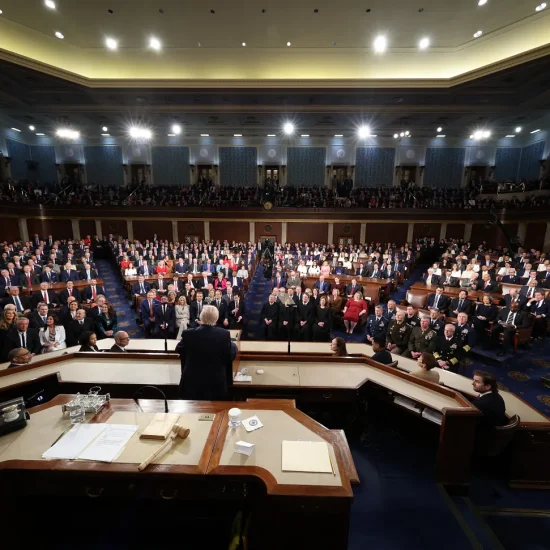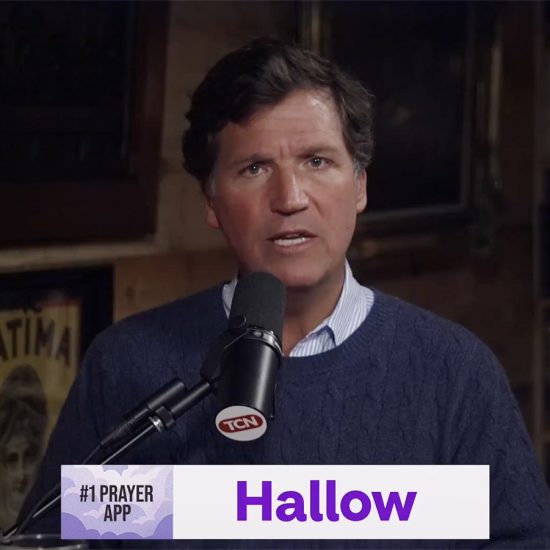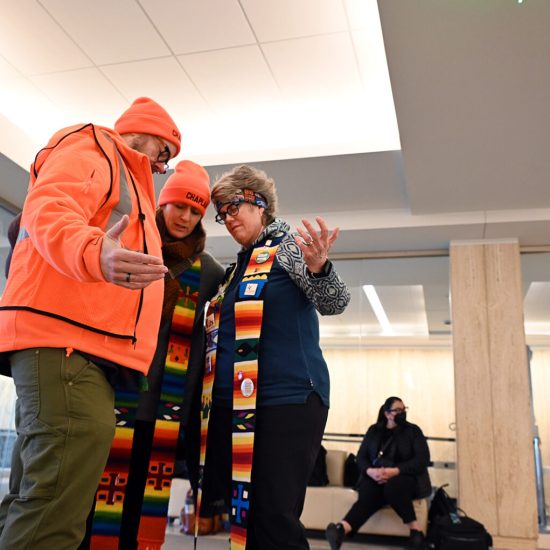
We gotta figure this out together. Ecumenical Christians, we who believe God has endowed every human being with dignity and who own the call to love God fully and our neighbors as ourselves, have yet to voice adequate public responses to the dominionist streams of Christianity. These Christians, having rejected those core values, demand to rule over society and now enjoy access to the highest levels of power in the United States.

Dr. Greg Carey
We must learn to testify.
Three years ago, I began offering talks on Christian Nationalism. In churches and bars, on podcasts, and in writing, I explained what Christian Nationalism is and why it poses a threat both to democracy and to the gospel.
I learned a great deal from those talks and from continuing to watch and study. Quickly, I saw that we ecumenical Christians gravely misunderstood the threat. Our fellow Christians have indeed aligned with policies that expose many Americans to discrimination and harassment, persecute LGBTQ+ persons, abandon our democratic allies, and will intensify the damage wrought by climate change. We did not understand the scale of that movement.
I should have known. A good deal of my scholarship involves the book of Revelation and ancient apocalyptic literature. I’m kind of an expert. But where hundreds of people will see my work, millions will watch and hear “bad” eschatology on YouTube, TikTok, radio, and television. Almost all of us failed to account for the (literally) billions of dollars devoted to radicalizing Christian social values away from justice and mercy and toward resentment and fear.
We did not understand the breadth of the movement. In 2016 the term “Christian Nationalist” conjured images of the old religious right, people like Franklin Graham, Ralph Reed, or Jerry Falwell Jr. We did not realize that they had joined a coalition that featured independent charismatic apostles and prophets who teach that Christians should exercise dominion over the so-called seven mountains of culture in every nation, radical Reformed theobros who teach that women should not be allowed to vote and heretics should be persecuted, and Catholic integralists who believe the government should promote the values of the church.
We did not appreciate that diverse Christian groups who regard one another as deficient, if not heretical, would so readily cooperate for political ends. We did not anticipate how specifically their agenda would aim to hurt women and minorities, including sexual minorities. We could not imagine Christians waving “Mass Deportation Now!” signs. And we were not ready for Christians who resisted their agenda to be called “demonic.” Now here we are.
But we also failed to develop an effective theological response. As one small voice among thousands, I suggest that we learn to testify.

Photo by Nina Strehl on Unsplash
Testimony played a prominent role in my Southern Baptist roots, as it does in many Black churches and in evangelical and charismatic settings. Publications by the womanist theologian Keri Day and biblical scholar Mitzi Smith, along with Mitzi’s colleague Michael Willett Newheart, have advanced testimony as a metaphor for theological education and biblical interpretation.
Testimony simply means sharing our own stories about how God has blessed our lives and our communities, how the gospel has shaped our imaginations. Testimony requires authenticity and vulnerability. In some ways, testimony resembles Bishop Mariann Budde’s homily at the most recent inauguration day prayer service. The bishop stirred a hornet’s nest simply by elevating dignity for every person, calling for honesty, endorsing humility — and for asking the new president to extend mercy to all people. She did not criticize or argue. She simply named her core values in the very specific moment that brought her to the pulpit.
For a couple of years now, I have been encouraging people to learn how to testify. We have erred by arguing. We have vented our outrage in social media posts. What’s worse, we have done so in sermons. We have wielded the sword of sarcasm. We have raised our voices. Outrage has its place. God sometimes calls us to be fierce in defending the vulnerable, and we must. But those modes of discourse almost never win hearts.
Christians occasionally invent new sins. About twenty years ago, we learned that some pastors were condemning the “sin of delaying marriage,” teaching young women and men they were obligated to marry and have children as soon as possible. The new sin, shared across many streams of Christian dominionism, is “the sin of empathy.” You can find condemnation of this new sin from the renegade Reformed pastor Douglas Wilson in a video that attracted over 90,000 views and from the charismatic musician Sean Feucht in a tweet that received 67,000 views. Someone is coordinating the messaging.
Our impulse may be to vent outrage. Mine is. We might be tempted to argue. We could point out that the word empathy didn’t enter the English language until psychologists developed it in the early twentieth century. Neither of those approaches is effective. Researchers in communication studies and psychology have long told us that it doesn’t work to counter someone else’s mistruth. Our mission is to testify. And that’s simple.
“I follow Jesus, and he called me to love my neighbor as myself.”
“When the Samaritan acted on his compassion, Jesus said, ‘Go and do likewise.’ I admire people who act that way.”
“I believe in the dignity of every person, regardless of their circumstances.”
“One of my favorite things about Christians is that we’re often the first to show up for people in need.”
Or even, in good evangelical language, “I’m grateful God has been merciful to me.”
These are just suggestions. The point is, we need to articulate our most basic Christian values in ways that are affirmative rather than defensive. We need to avoid unproductive arguments. We also gain courage and strengthen one another when we articulate our deepest values.
Most of all, we need to live our values out loud. There is no substitute for organized action. We must pursue it. But we must also learn how to set the terms of discourse. In that realm, acting on the defensive does more harm than good. I wish I’d internalized that principle three years ago.
Greg Carey teaches New Testament at Lancaster Theological Seminary and Moravian Theological Seminary. His books include Using Our Outside Voice: Public Biblical Interpretation.






